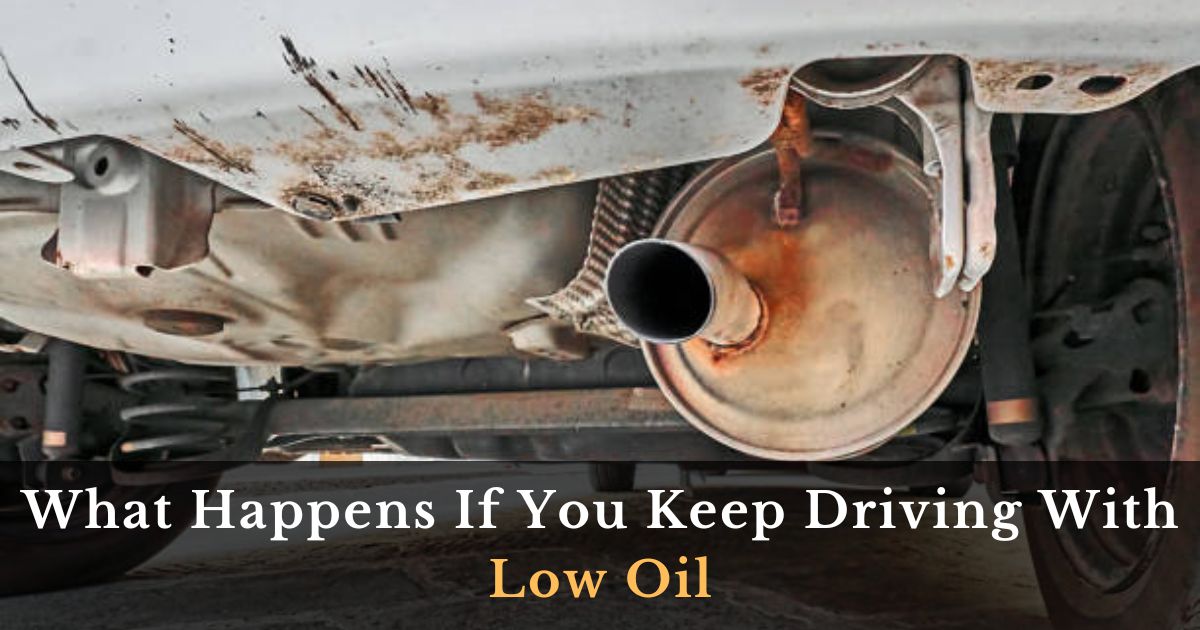What happens if you keep driving with low oil, Driving with low oil might not seem like a big deal, but it can cause serious problems for your car over time. Lots of drivers don’t notice the signs or put off getting an oil change, not realizing how bad it can be. In this article, we’ll talk about what happens if you keep driving with low oil and why it’s really important to deal with it quickly.
Imagine your car’s engine as the heart of your vehicle, and oil as its lifeblood. Just like our bodies need enough blood to function properly, your car’s engine requires sufficient oil to run smoothly. But what if you ignore that warning light on your dashboard indicating low oil? Let’s explore the consequences of driving with low oil and why it’s crucial to address this issue promptly.
What is Low Oil?
Before understanding the effects of driving with low oil, let’s define what it means. Low oil, also known as low engine oil or oil level, occurs when there isn’t enough lubricant in your car’s engine to keep it running smoothly. Engine oil is essential for lubricating moving parts, reducing friction, and preventing overheating.
Effects of Driving With Low Oil
Engine Damage: The primary function of engine oil is to lubricate various components within the engine. When oil levels are low, these components can rub against each other, leading to increased friction and wear. Over time, this friction can cause irreversible damage to the engine, resulting in costly repairs or even engine failure.
Overheating: Oil not only lubricates but also helps in dissipating heat generated by the engine. When oil levels are low, the engine can’t effectively transfer heat away, leading to overheating. This can damage vital engine components, such as the pistons and cylinders, and may require extensive repairs.
Reduced Fuel Efficiency: Low oil levels can also impact your car’s fuel efficiency. Without proper lubrication, the engine has to work harder to perform its functions, leading to increased fuel consumption. Over time, this can result in higher fuel costs and decreased mileage per gallon.
Increased Emissions: An improperly lubricated engine may produce more emissions than usual. As the engine works harder due to low oil levels, it can lead to incomplete combustion of fuel, resulting in higher levels of pollutants being released into the atmosphere. This not only harms the environment but can also lead to failed emissions tests.
Engine Knocking or Ticking Sounds: One of the most noticeable signs of low oil is strange noises coming from the engine, such as knocking or ticking sounds. This indicates that the engine components are not adequately lubricated and are rubbing against each other, causing damage.
Risk of breakdown: Ignoring low oil levels is like ignoring a warning sign of an impending disaster. Continued driving with insufficient oil puts your vehicle at risk of sudden breakdowns or malfunctions, leaving you stranded on the side of the road and facing expensive towing and repair bills.
Increased fuel consumption: Driving with low oil can also result in higher fuel consumption. As engine components experience increased friction and resistance, more energy is required to overcome these obstacles, leading to reduced fuel efficiency. Over time, this can translate to higher fuel costs and added strain on your wallet.
Signs of Low Oil
It’s essential to keep an eye out for signs that your car is running on low oil. These include:
Dashboard warning light
Engine knocking or ticking noises
Excessive exhaust smoke
Burning smell coming from the engine
Poor engine performance
Preventing Low Oil
To avoid the problems associated with driving on low oil, follow these tips:
Check your oil levels regularly and top up as needed.
Follow your car manufacturer’s recommended oil change schedule.
Keep an eye out for any signs of oil leaks and address them promptly.
Be mindful of your driving habits, as excessive speeding or towing heavy loads can accelerate oil consumption.
Preventing Damage
To avoid the consequences of driving with low oil, it’s essential to perform regular oil checks and change your oil as recommended by your car manufacturer. Pay attention to warning lights or dashboard alerts indicating low oil pressure or oil level. If you notice any signs of low oil, such as engine noise or decreased performance, address the issue immediately by adding oil or scheduling an oil change.
Driving with low oil can have serious consequences for your car’s engine and overall performance. From engine damage to reduced fuel efficiency and increased emissions, the effects of low oil can be detrimental. By staying vigilant and addressing low oil issues promptly, you can prevent costly repairs and keep your car running smoothly for years to come. Remember, proper maintenance is key to ensuring your vehicle’s longevity and performance on the road.
FAQs
How often should I check my oil levels?
It’s recommended to check your oil levels every time you fill up your gas tank or at least once a month.
What should I do if I notice my oil levels are low?
If you notice low oil levels, top up your oil immediately to prevent damage to your engine.
Can I use any type of oil to top up my engine?
It’s to use the same type of oil that is already in your engine. Check your owner’s manual for specifications.
What are the consequences of ignoring low oil levels?
Ignoring low oil levels can lead to increased engine wear, reduced performance, and eventually engine failure.
How can I tell if my engine is damaged due to low oil?
Signs of engine damage due to low oil include knocking or ticking noises, reduced performance, and engine warning lights.



